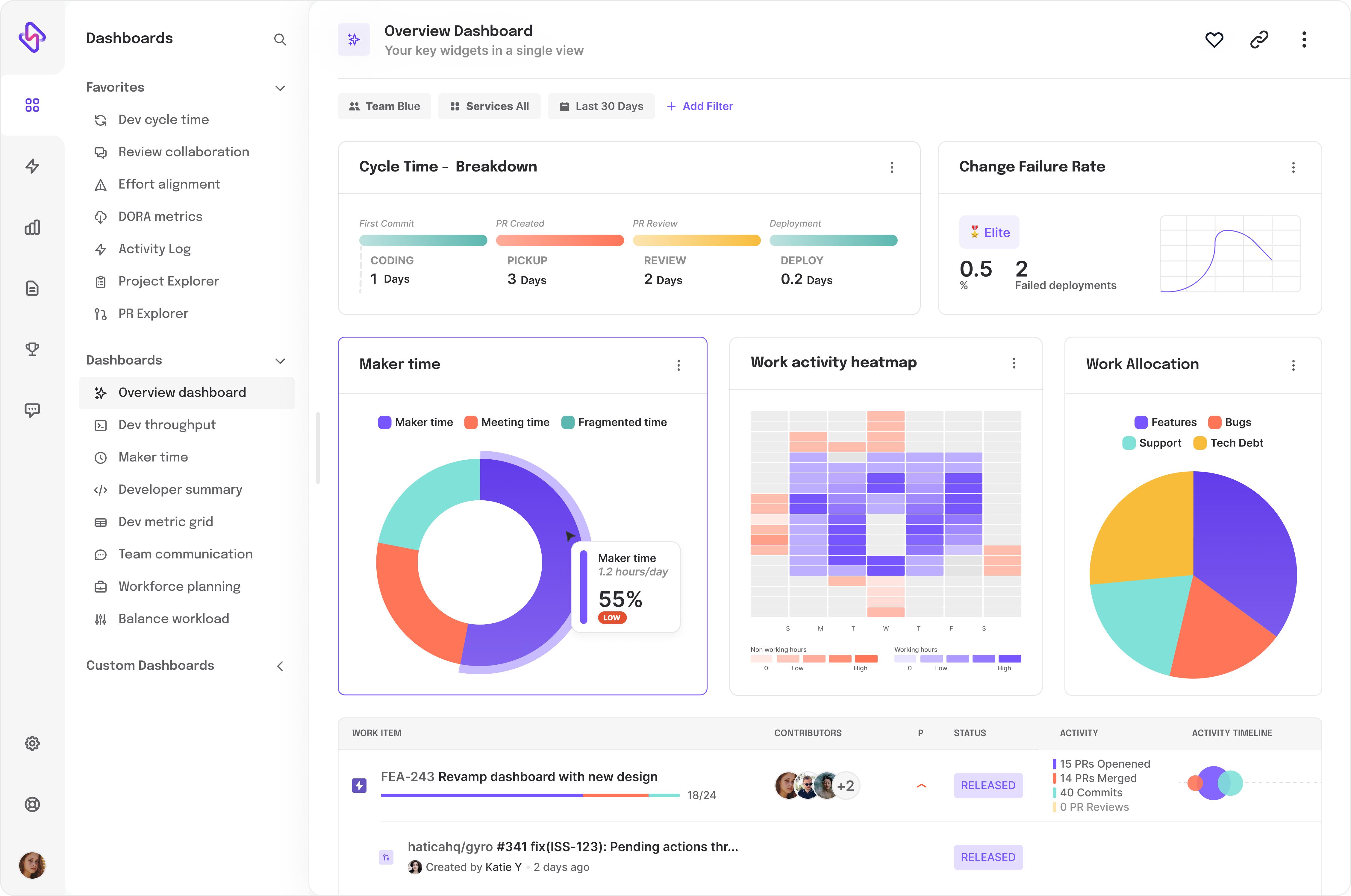One-on-one meetings are more than just check-ins—they’re a chance to really connect with your remote team members, understand their day-to-day challenges, and offer support where it’s needed most. For remote employees, these meetings can be a lifeline, helping them stay engaged, motivated, and part of the larger company culture. By asking the right questions, you can build trust, uncover issues early, and make sure your team feels seen and valued.
But how do you make the most out of these conversations? Let’s start by looking at how to structure your one-on-ones, followed by some key questions you can ask to keep your remote employees thriving.
How to Structure One-on-One Meetings?
Before jumping into the questions, it’s important to set up your one-on-ones in a way that feels natural but also ensures you’re covering the essentials. A little preparation can go a long way in making sure both you and your employee walk away feeling heard and clear on next steps.
Whether you’re discussing career growth, team dynamics, or recent projects, having a flexible structure helps you stay on track while still keeping things personal and meaningful.
Here’s a simple structure to guide your one-on-one meetings:
- Informal Check-In (5 minutes)
Start with a casual, “How’s it going?” This helps break the ice and set a relaxed tone. - Recent Work Recap (10 minutes)
Dive into what the employee’s been working on lately. Talk about their successes, any hurdles they’ve faced, and how they’re feeling about their progress. - Upcoming Work Prep (10 minutes)
Shift the conversation to what’s next. What projects are coming up? Are there any concerns or resources they might need to get things done? - Wrap-Up and Action Items (5 minutes)
Summarize the key takeaways and nail down any action items. This helps ensure both sides are aligned on what needs to happen before the next check-in.
If your meeting is more focused on goal setting, here’s a slightly different structure:
- Employee Self-Reflection (before the meeting)
Have your employee reflect on their goals and any challenges ahead of time. This gives them the chance to think things through and come prepared to discuss. - Setting Goals (during the meeting)
Work together to define both short-term and long-term goals. It’s a great way to make sure their development aligns with both personal aspirations and business needs. - Establish Action Steps (at the end of the meeting)
Break down those big goals into smaller, actionable tasks. This makes it easier to track progress and celebrate wins in future meetings.
Now that you have a basic structure, let’s get into some real, conversation-starting questions.
Key Questions for One-on-One Meetings with Remote Employees
These are the kind of questions that can lead to deeper discussions and help you really understand where your employee is coming from.
1. Checking In: Keep It Simple, Keep It Honest
Sometimes the best way to start is with a simple check-in. These questions are great for getting a sense of how they’re doing, what’s on their mind, and how you can best support them.
Try asking:
- What’s been on your mind lately?
This helps open the door for them to share what’s top of mind, whether work-related or not.
- Can you tell me about a recent project you’re proud of?
A nice way to spotlight their successes and talk through what made it work.
- Is there anything you’re stuck on that I can help with?
Shows you’re ready to offer support wherever needed.
💡 Tip: Regular check-ins can have a big impact on motivation and overall happiness. Studies have shown that employees who feel heard are more engaged and productive.
2. Going Beyond Work: Make It Personal (But Not Too Personal)
One-on-ones don’t have to be all about work. In fact, talking about life outside of work can help you build a stronger connection with your team. But it’s important to find the right balance—showing interest without crossing any boundaries.
Here are a few personal, but respectful, questions:
- How’s everything outside of work going?
Simple but effective. It gives them a chance to share what’s going on in their life.
- How’s your work-life balance been lately?
This can spark a bigger conversation about stress, burnout, or anything that might be affecting them.
- What do you do to unwind after work?
Helps you understand what keeps them refreshed and whether they’ve had time for it.
💡 Tip: Remember little details from past conversations, like a hobby they enjoy or a recent family event. It shows you’re paying attention and genuinely care.
3. Motivation and Engagement: What Keeps Them Going?
Remote work can sometimes feel isolating, so it’s important to check in on what’s keeping your team motivated and engaged. These questions help you tap into what excites them about their work (or what’s holding them back).
Try asking:
- What’s the most exciting thing you’re working on right now?
This question often leads to a deeper discussion about what they enjoy most in their role.
- Do you ever feel like you’re in a rut? How can we make your work more interesting?
A great way to gauge if they’re feeling challenged enough or need new opportunities.
- What upcoming projects are you most excited about?
Helps you align their enthusiasm with what’s next on the horizon.
One-on-ones are a great time to talk about performance—not just theirs, but yours too. It’s not about waiting for a formal review; it’s about having ongoing conversations that help both of you improve.
Here’s how you can keep the conversation open:
- What do you think your biggest strengths are in the team?
This gives them a chance to reflect on their own contributions.
- Is there anything I can do differently to support you better?
Make it clear that feedback goes both ways—leaders need it too.
- Are there any areas where you feel stuck and need more guidance?
This is your opportunity to offer targeted support for their development.
💡 Tip: Early performance conversations, especially with new hires, set a great foundation for future growth. Regular feedback after 30, 60, and 90 days helps build trust and set expectations.
5. Team Alignment: Keep Everyone on the Same Page
Remote teams need strong communication to stay aligned. These questions will help you figure out if your team is working smoothly together or if there are any issues that need to be addressed.
Ask them:
- Do you feel like the team is communicating well?
This question can uncover any gaps in communication or collaboration.
- Is there anything getting in the way of working well with your colleagues?
Gives them the space to address any potential blockers or issues within the team.
- If you could change one thing about how we work as a team, what would it be?
A simple way to encourage them to share ideas for improving team dynamics.
6. Career Growth: Dream Big, Plan Smart
One-on-ones are a great time to help your team members think about where they want to go in their careers. Use these questions to open up conversations about their long-term goals and how you can support them.
Here are some career-focused questions:
- How do you feel about your progress in your role so far?
This is a good way to check if they feel like they’re moving forward.
- What skills or experiences are you hoping to gain over the next year?
Helps you tailor development opportunities to their needs.
- Are we helping you grow in the ways that matter to you?
This shows that you’re invested in their future, not just their current tasks.
💡 Tip: Career conversations don’t always have to be about promotions or raises. Sometimes it’s about new challenges, learning opportunities, or skill-building.
7. Handling Challenges: Helping Them Tackle the Tough Stuff
No job is without challenges, and your one-on-one meetings are the perfect time to discuss what’s making things difficult. Whether it’s workload, communication, or personal stressors, you can work together to find solutions.
Here are some questions to explore challenges:
- What’s been the most challenging thing you’ve faced recently?
This invites them to be honest about what’s been tough.
- Is there anything that’s making your job harder than it needs to be?
Helps identify blockers and find ways to remove them.
- How can I support you better during stressful times?
Shows you’re there to help when things get tough.
By asking the right questions, you create an open space for meaningful conversations that lead to better engagement, motivation, and success. So next time you sit down for a one-on-one, use these questions to spark real conversations and strengthen your relationship with your remote employees.
Closing Thoughts
Asking the right questions opens the door to meaningful dialogue and it requires the manager’s active involvement to make the one-on-one effective by way of listening with empathy and following up with the necessary questions and actions when appropriate.
Being armed with the right set of questions to ask in a remote one-on-one is one part of managing a remote team. The other part is relying on a data-driven understanding of a teams’ work activities, collaboration patterns, productivity signals, and burnout signals to structure productive and empathetic conversations that prompt action and lead to individuals thriving in a team.
💡 Engineering managers use Hatica to track these metrics alongside personal and team goals to drive effective 1:1s that build performant engineering teams. Interested in building a data-driven meeting culture for your organization? Learn how Hatica can help.






